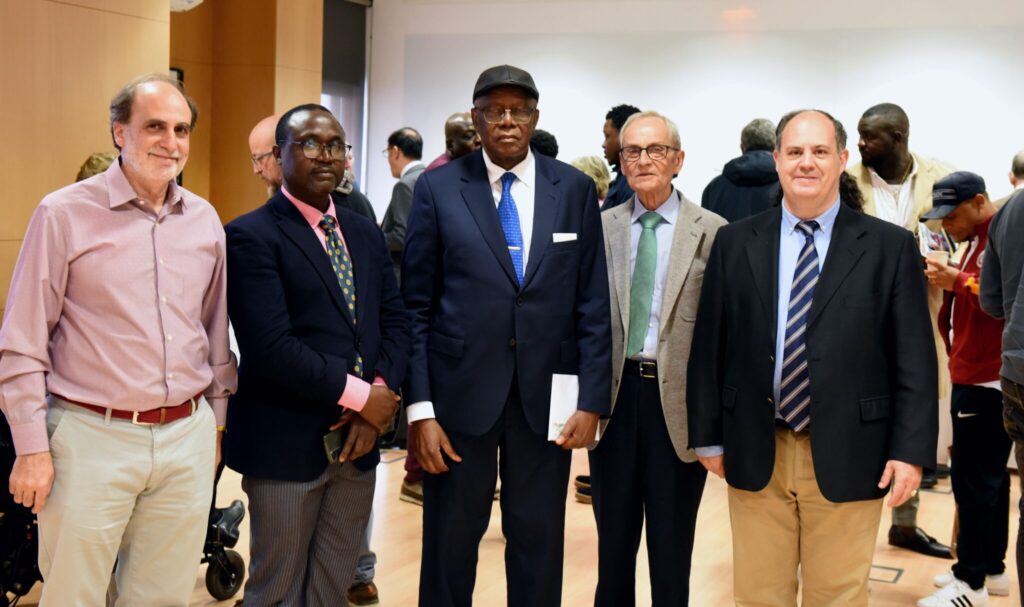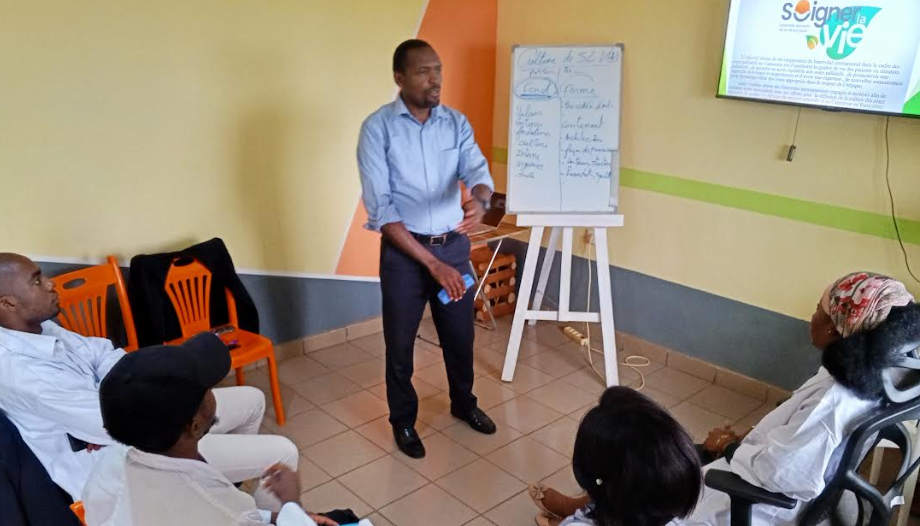The Republic of Cameroon is a Central African state of almost half a million square kilometers, with 28 million inhabitants, 40 percent Christian (Catholics and Protestants), 20 percent Muslim, and about 40 percent animist. The country has borders with Equatorial Guinea, Gabon, Republic of Congo, Central African Republic, Chad, and to the west with Nigeria.
Known for its geological diversity and its culture, music for example, and also for its sport, having won five times the African Cup of Nationssecond only to Egypt (7), Cameroon is one of only four African teams, along with Ghana, South Africa and Morocco, to have reached the quarterfinals of the World Cup.
At the presentation ceremony in Madrid of "Soigner la Vie" ("Caring for Life"), people from half a dozen African countries participated. In addition to the Cameroonian ambassador, representatives from Congo, Nigeria, Gambia, and people from Senegal and Morocco, among other countries, attended. The Cameroonian ambassador in Spain, Paulin Godfried Yanga, wanted to support the initiative with the diffusion of the Association among the Cameroonian community in Spain, as real protagonists to help their compatriots in a more precarious situation..
Another "Lagune" in Cameroon
The host, General Manager of the Hospital de Cuidados LagoonDavid Rodríguez-Rabadán, explained the link between Laguna and "Soigner la Vie" in support and training to ensure that in the future there will be another "Lagune" in Cameroon in a few years.
Encarnación Pérez Bret, PhD in nursing and social anthropology, nurse Laguna's palliative care coordinator, explained "the need to promote palliative care as the first way to fight against euthanasia" and the urgency of promoting "the culture of palliative care" in Africa, where it is still in its infancy.
Also taking part in the presentation, led by the actress and writer Eva Latonda, were the representative of Soigner La Vie in Spain, Pablo Pérez-Tomé, the doctor Javier Sánchez Ayuso, and the volunteers Steve Kommengne and Juan Luis García Hermoso, who has been a volunteer for almost 25 years and who, for the first time in his life, at the age of 70, has gone to Yaoundé to help for a couple of months. The testimony of the writer Isabel Sanchez from Colombia. Author of the book "Take care of us."wanted to support the initiative.
To explain the work done so far by SLV, the president of Soigner La Vie, Paul Christian Tsotie (Yaoundé, 1989), spoke from Cameroon and talked to Omnes about palliative care in his country and in Africa. Tsotie is a nurse specialized in palliative care and pain management with 10 years of experience, and associate professor at the School of Health Sciences of the Catholic University of Central Africa (ESS-UCAC).
What are SLV's objectives in Cameroon?
- To spread the culture of pain medicine and palliative care in Cameroon and Central Africa through training/education and promotion of palliative care delivery, and to prevent chronic diseases, mainly cancers.
How is the global need for palliative care.
- According to the Global Atlas of Palliative Care, more than 56.8 million people worldwide need palliative care each year, including 31.1 million before and 25.7 million at the end of life. The majority (67.1 %) are adults over 50 years of age and at least 7 % are children. The majority (54.2 %) are non-deceased who need palliative care before their last year of life.
The burden of serious illness and health-related suffering, and the corresponding need for palliative care, are immense. However, most people in need do not have access to palliative care, especially in low- and middle-income countries (LMICs). The majority of adults in need of palliative care (76 %) live in LMICs, and the largest proportion are in low-income countries. Noncommunicable diseases account for almost 69 % of adult needs.
Which diseases and areas of the world require the most palliative care?
- Among adults, the diseases and conditions that generate the greatest suffering requiring palliative care interventions are cancer, HIV/AIDS, cerebrovascular disease, dementia and lung disease.
The Western Pacific, Africa and Southeast Asia regions account for more than 64 % of adults in need of palliative care, while the Europe and Americas regions have 30 % and the Eastern Mediterranean region 4 %.
The greatest need by population is found in the African region (related to the high incidence of HIV/AIDS), followed by the European and American regions that have older populations.
In almost all regions of the world, adults whose need for palliative care is generated by non-malignant conditions constitute the greatest need, followed by cancer. Only in the African region does HIV/AIDS predominate over malignant and other non-malignant diseases.
And in Cameroon?
- According to the National Strategic Plan to Fight Cancer (PSNLCa) 2020-2024, there are 15,700 new cases/year, of which 9,335 are women; 80 % of new cases are diagnosed late and almost all will die within a year; there are 10,533 deaths per year; according to "ecancermedicalscience", there are 78,125 people in need of palliative care, i.e. 3,100 HIV patients and 75. 000 cancer-related cases. In addition, there are few organizations committed to this field of medicine, which is not very attractive.


How do you see awareness and training in palliative care?
- The Soigner La Vie Association, together with other associations such as Vopaca, Adespa, Alternative Santé and Santo Domingo, carries out awareness-raising, training and education activities, as well as campaigns in schools, families and communities to inform the masses about the issue of palliative care.
Access to opioids and other pain medications is a problem for...
- Access to opioids, such as morphine, is a real problem in Cameroon. Efforts are being made in this regard. Morphine in oral solution has been available for a few months now, but this analgesic remains inaccessible given the need expressed. This is not only the case in Cameroon, but in Africa in general. Access to other pain medications is relative.
Africa rejects euthanasia, is this correct?
- In Africa, life has a culturally sacred character and all African countries consider the issue of euthanasia as a real sacrilege.
The brief conversation with Paul Christian Tsotie concludes. It should be recalled that some entities have helped in the presentation of SLV in Spain such as the Friends of Monkole FoundationThe Vianorte-Laguna Foundation and the La Vicuña Foundation ARBOR VITAE and IDOC i FTIH. The Adeste Foundation, the Recover Foundation and the French Adespa Foundation were also present in some way with their support.












